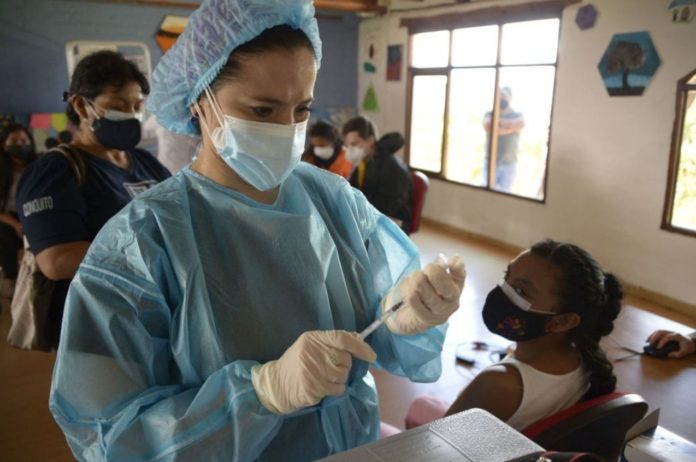Breakthrough infections, or COVID-19 in fully vaccinated, were expected to be uncommon, according to a paper released by the Centers for Disease Control and Prevention in May.
From January through April, statistics showed that just 0.01 percent of vaccinated Americans had a breakthrough case.
But it was before the Delta strain, which is more transmissible, became the prevalent strain in the United States.
- Does This Mean We Stopped Being Animal and Started Being Human Due to ‘Copy Paste’ Errors?
- The One Lifestyle Choice That Could Reduce Your Heart Disease Risk By More Than 22%
- Aging: This Is What Happens Inside Your Body Right After Exercise
- Immune-Boosting Drink that Mimics Fasting to Reduce Fat – Scientists ‘Were Surprised’ By New Findings
- Gun Violence in America: What They Don’t Talk About at the Debate
As more individuals get vaccinated, the number of breakthrough infections will surely increase – but it’s difficult to say how many of these instances have happened since the CDC study was released. On May 1, the CDC decided to cease monitoring asymptomatic, mild, or moderate breakthrough cases.
Though existing vaccinations still protect against Delta, the odds of you or someone you know developing a breakthrough case are greater than they’ve ever been.
Regardless of the variation, most disease experts anticipate COVID-19 to be milder in vaccinated individuals.
“The variants may cause you to still maybe get an infection, but not serious,” Peter Gulick, an associate professor of medicine at Michigan State University, told Insider in June.
“It would be almost like getting an infection with the common cold or one of those nagging things that gives you sniffles and a cough and makes you feel a little tired, but nothing serious enough to put you in the hospital or put you on a ventilator.”
Indeed, according to the COVID Symptom Study, which uses an app to monitor self-reported COVID-19 symptoms, a headache and runny nose are the two most common signs of infection among vaccinated individuals in the UK, followed by sneezing, sore throat, and loss of smell. People who had been vaccinated reported less overall symptoms over a shorter period of time than those who had not been vaccinated.
Insider talked with two young individuals who had just recovered from minor breakthrough infections to learn more about their symptoms.
In mid-April, Sam Reider, a musician from San Francisco, was completely immunised with Pfizer’s injection. (According to new study, Pfizer’s two-dose COVID-19 vaccine is only 88 percent effective against symptomatic COVID-19 from Delta, compared to 95 percent for the original strain.)
But Reider got sick anyway. His first symptoms – exhaustion and a headache – resembled “that feeling of being super jet-lagged after an international flight,” he said.
Soon after, he started to feel congested and short of breath – symptoms that lasted for about two weeks after he tested positive for COVID-19.
“Basically any sort of exercise or even talking on the phone was hard for the first week,” Reider said. “At the ends of my sentences, I would need to slow down and stop, take a bunch of deep breaths.”
“After a year and a half of all of this, to go out feeling confident with the vaccine and then get it – it was just upsetting,” Reider said. Still, he added, “it was nowhere near as bad as the times that I’ve had pneumonia or a severe flu or cold.”
Ryan Forrest, of Midland Park, New Jersey, got a single-dose vaccine from Johnson & Johnson in late March and subsequently attended a 150-person indoor wedding on July 1.
“I never had more than two symptoms at the same time,” Forrest said, adding,
“The runny nose turned into a stuffy nose, which then turned into a headache and then my body aches went away and I got that dry cough.”
He said that the most lasting symptom was a loss of smell (he never lost his sense of taste). He stated that none of the symptoms were severe, and that they all went away within two weeks.
Even though he became ill, Forrest is grateful that the vaccination seemed to protect his parents, who spent an hour and a half in the vehicle with him the day before he tested positive.
“That’s the important part for me,” he said.
“I don’t really care how sick I got as long as I wasn’t giving it to my dad, who’s 67.”
- Does This Mean We Stopped Being Animal and Started Being Human Due to ‘Copy Paste’ Errors?
- The One Lifestyle Choice That Could Reduce Your Heart Disease Risk By More Than 22%
- Aging: This Is What Happens Inside Your Body Right After Exercise
- Immune-Boosting Drink that Mimics Fasting to Reduce Fat – Scientists ‘Were Surprised’ By New Findings
- Gun Violence in America: What They Don’t Talk About at the Debate
It proves that J&J’s shot reduced the likelihood of moderate and severe COVID-19 by 66 percent but Breakthrough infections may be more frequent with Johnson & Johnson’s injection than with Pfizer’s or Moderna’s, due to the reduced effectiveness of that vaccination.
Photo by RODRIGO BUENDIA / AFP) (Photo by RODRIGO BUENDIA/AFP via Getty Images
